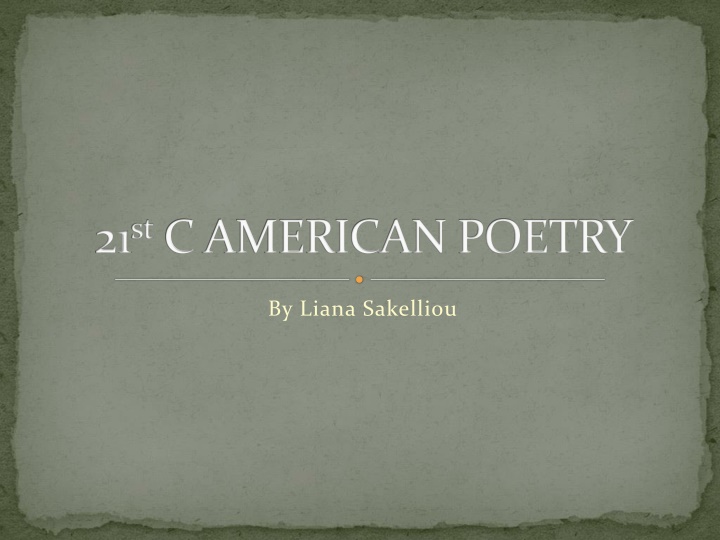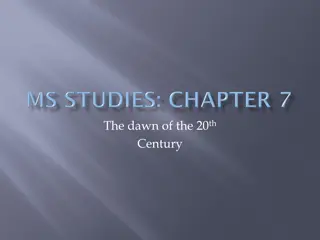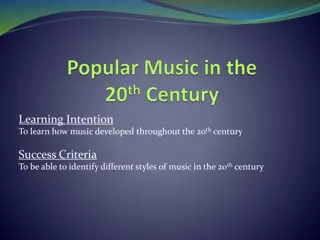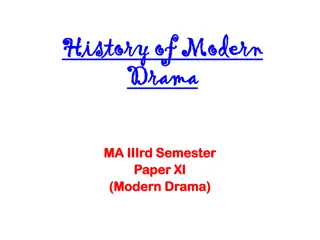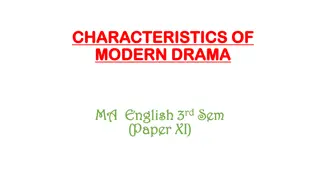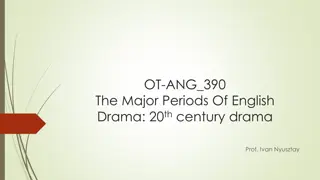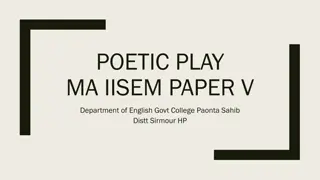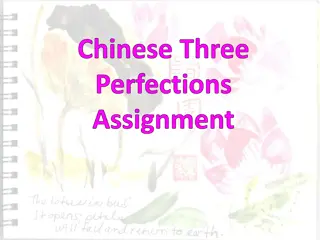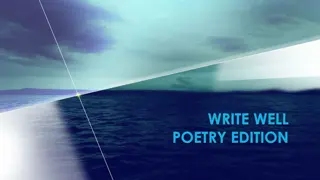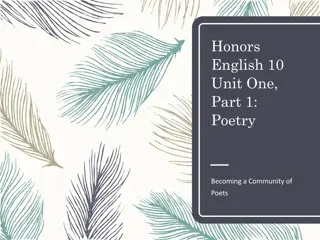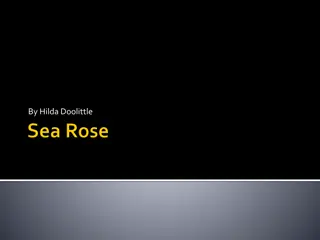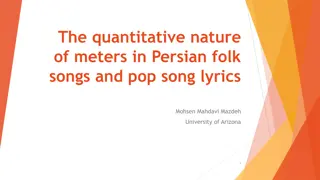American Poetry Through the 20th Century
American poetry in the 20th century underwent significant changes and reflections of societal shifts. From modernism's exploration of spirituality and cultural upheaval to the countercultural movements of the 60s, poets like T.S. Eliot, Allen Ginsberg, and others captured the essence of their times. The evolution of poetry mirrored the changing landscapes, technologies, and ideologies of the era, providing insight into human experience and social commentary.
Download Presentation

Please find below an Image/Link to download the presentation.
The content on the website is provided AS IS for your information and personal use only. It may not be sold, licensed, or shared on other websites without obtaining consent from the author.If you encounter any issues during the download, it is possible that the publisher has removed the file from their server.
You are allowed to download the files provided on this website for personal or commercial use, subject to the condition that they are used lawfully. All files are the property of their respective owners.
The content on the website is provided AS IS for your information and personal use only. It may not be sold, licensed, or shared on other websites without obtaining consent from the author.
E N D
Presentation Transcript
21stC AMERICAN POETRY By Liana Sakelliou
MODERNISM T.S. Eliot s The Waste Land (1922): Western civilization as a bleak desert in need of rain, a spiritual renewal. It echoes Dante s Inferno to evoke London s streets around WWI. I had not thought death had undone so many (lines 60- 63) Studied Sanskrit and Oriental philosophy. Wrote abstract iconoclastic poetry. Ezra Pound s Cantos and In a Station of the Metro The apparition of these faces in the crowd; Petals on a wet, black bough.
MODERNISM Depression in the 1930s: Many saw it as punishment for sins of excessive materialism and loose living. Puritanism started reappearing during the Depression, with the Old Testament judgment: the whirlwind by day and the darkness at noon many dust storms appeared and were thought of as signs. Social conformity, constraint, predestination and beliefs in simplicity as opposed to progress and financial ambition. War production, experimentation led to new technologies, including the nuclear bomb. Robert Oppenheimer (nuclear scientist) quoted a Hindu poem: I am become Death, the shattererof worlds. Don t forget R.W. Emerson s and H.D. Thoreau s readings of Hinduism, Confucianism, Sufism eastern religion.
MODERNISM Technological, mechanized way of living. Abstract visual repetitions in art: Pablo Picasso and Gertrude Stein. Dislocation of features/ dislocation of grammar, syntax, punctuation. Tender Buttons (1914), Stein s cubist painting. William Carlos Williams The Red Wheelbarrow captures an instant of time like a snapshot: So much depends upon E.E. Cummings in Just , a celebration of love and eroticism, experimented with punctuation and visual format on the page. A poem had to come from art=the visual first, then the oral. Marianne Moore s poems are imaginary gardens with real toads in them. Moore was influenced by H.D. and she influenced Elizabeth Bishop. a red wheel barrow glazed with rain water beside the white chickens.
THE 60's Allen Ginsberg s first recitation of his poem Howl, on October 13, 1955, at the Six Gallery in San Francisco, ended in tears, both from himself and from members of the audience. The people gasped and laughed and swayed, they were psychologically had, it was an orgiastic occasion. Howl had sexual explicitness and personal references, untraditional language, homosexual references. It had social criticism. Immediately following the Six Gallery reading, Lawrence Ferlinghetti, the publisher for City Lights Books, contacted Ginsberg, stating: I greet you at the beginning of a great career. When do I get the manuscript?
THE 60's From a private culture to a media culture WWII , consumerism in a mass urban society, the protest movements of the 1960s, The Vietnam War, the Cold War, environmental threats. Radio, movies, television, compact discs, cassettes, film. Poetry seemed important because it could express subjective life. It could articulate the impact of technology and mass society on the individual.
Post WWII Decentralized, varied poetry. 3 types of poetry: The traditional: James Merrill, Randall Jarrell, A.R. Ammons, Gwendolyn Brooks, Adrienne Rich, Robert Lowell The idiosyncratic: John Berryman, Theodore Roethke, Elizabeth Bishop. Sylvia Plath (Ariel, 1965) and Anne Sexton (Live or Die, 1966) write autobiographical poetry, taboo subjects with brutal directness. The experimental: Inspired by Jazz and abstract expressionist painting. In search of new values in the archaic world of myth, legend, and traditional societies such as those of the American-Indian. The forms are spontaneous, organic, they arise from the subject matter and the feeling of the poet as the poem is written, and from the natural pauses of the spoken language. Donald Allen The New American Poetry, 1945-1960: The Black Mountain School The San Francisco School Beat Poets The New York School Surrealism and Existentialism 1. 2. 3. 4. 5.
Post WWII Women Poets and Feminism Multiethnic Poets The Language School, Experimentation and New Formalism (Poetry that stretches language to reveal its potential for ambiguity, fragmentation, and self- assertion within chaos. Language poets favor open forms and multicultural texts; they appropriate images from popular culture and the media and refashion them.)
Home: a world of big business and economic boom in which each citizen functions with pride in the conspiracy against the individual. Home: the place where s/he might have been born, a land of freedom a product of the mind as a geographical location. The poets had to detach themself from their given , native land as it had betrayed the American Dream. The American poets-exile were living out a paradox, never closer at home than when they were asserting their distance from it.
Notion of Place Place by WCW: We live only in one place but far from being bound by it, only through it do we realize our freedom we do not have to abandon the familiar and known to achieve distinction rather in our place, if we only make ourselves sufficiently aware of it, do we join with others in other places. Paterson by WCW: It lies in the valley under the Passaic Falls/ its spent waters forming the outline of his back. He lies on his right side, had near the thunder of the waters filling his dreams! Eternally asleep, his dreams walk about the city where he persists incognito.
Skunk Hour by Robert Lowell Nautilus Island s hermit The season s ill heiress still lives through winter in her Spartan cottage; we ve lost our summer millionaire, her sheep still graze above the sea. who seemed to leap from an L. L. Bean Her son s a bishop. Her farmer catalogue. His nine-knot yawl is first selectman in our village; was auctioned off to lobstermen. she s in her dotage. A red fox stain covers Blue Hill. Thirsting for And now our fairy the hierarchic privacy of Queen Victoria s century, decorator brightens his shop for fall; she buys up all his fishnet s filled with orange cork, the eyesores facing her shore, orange, his cobbler s bench and awl; and lets them fall. there is no money in his work, he d rather marry.
Skunk Hour by Robert Lowell One dark night, only skunks, that search my Tudor Ford climbed the hill s skull; in the moonlight for a bite to eat. I watched for love-cars. Lights turned down, They march on their soles up Main Street: they lay together, hull to hull, white stripes, moonstruck eyes red fire where the graveyard shelves on the town. . . . under the chalk-dry and spar spire My mind s not right. of the Trinitarian Church. I stand on top A car radio bleats, of our back steps and breathe the rich air Love, O careless Love. . . . I hear a mother skunk with her columnof kittens swills the garbage pail my ill-spirit sob in each blood cell, She jabs her wedge-head in a cup as if my hand were at its throat. . . . of sour cream, drops her ostrich tail, I myself am hell; and will not scare. nobody s here
"To Speak of Woe That Is in Marriage" Robert Lowell-1917-1977 "It is the future generation that presses into being by means of these exuberant feelings and supersensible soap bubbles of ours." Schopenhauer "The hot night makes us keep our bedroom windows open. Our magnolia blossoms. Life begins to happen. My hopped up husband drops his home disputes, and hits the streets to cruise for prostitutes, free-lancing out along the razor's edge. This screwball might kill his wife, then take the pledge. Oh the monotonous meanness of his lust. . . It's the injustice . . . he is so unjust whiskey-blind, swaggering home at five. My only thought is how to keep alive. What makes him tick? Each night now I tie ten dollars and his car key to my thigh. . . . Gored by the climacteric of his want, he stalls above me like an elephant."
Sylvia Plath (1932-1963) Nick and the Candlestick Its first communion out of my live toes. The candle Gulps and recovers its small altitude, I am a miner. The light burns blue. Waxy stalactites Drip and thicken, tears Its yellows hearten. O love, how did you get here? O embryo The earthen womb Exudes from its dead boredom. Remembering, even in sleep, Your crossed position. The blood blooms clean Black bat airs Wrap me, raggy shawls, Cold homicides. They weld to me like plums. In you, ruby. The pain You wake to is not yours. Old cave of calcium Love, love, I have hung our cave with roses, With soft rugs Icicles, old echoer. Even the newts are white, The last of Victoriana. Let the stars Plummet to their dark address, Those holy Joes. And the fish, the fish Christ! they are panes of ice, Let the mercuric Atoms that cripple drip Into the terrible well, A vice of knives, A piranha You are the one Solid the spaces lean on, envious. You are the baby in the barn. Religion, drinking
Sylvia Plath (1932-1963) BerckPlage(1) This is the sea, then, this great abeyance. How the sun's poultice draws on my inflammation. Boomerang like anchored elastics, hurting the owner. Is it any wonder he puts on dark glasses? Electrifyingly-colored sherbets, scooped from the freeze By pale girls, travel the air in scorched hands. Is it any wonder he affects a black cassock? Here he comes now, among the mackerel gatherers Why is it so quiet, what are they hiding? I have two legs, and I move smilingly... Who wall up their backs against him. They are handling the black and green lozenges like the parts of a body. The sea, that crystallized these, Creeps away, many-snaked, with a long hiss of distress. A sandy damper kills the vibrations; It stretches for miles, the shrunk voices Waving and crutchless, half their old size. The lines of the eye, scalded by these bald surfaces,
Sylvia Plath (1932-1963) BerckPlage(2) This black boot has no mercy for anybody. Why should it, it is the hearse of a dad foot, Limbs, images, shrieks. Behind the concrete bunkers Two lovers unstick themselves. The high, dead, toeless foot of this priest Who plumbs the well of his book, O white sea-crockery, What cupped sighs, what salt in the throat.... And the onlooker, trembling, Drawn like a long material The bent print bulging before him like scenery. Obscene bikinis hid in the dunes, Through a still virulence, And a weed, hairy as privates. Breasts and hips a confectioner's sugar Of little crystals, titillating the light, While a green pool opens its eye, Sick with what it has swallowed----
Sylvia Plath (1932-1963) BerckPlage(3) On the balconies of the hotel, things are glittering. And my heart too small to bandage their terrible faults. This is the side of a man: his red ribs, Things, things---- The nerves bursting like trees, and this is the surgeon: One mirrory eye---- A facet of knowledge. On a striped mattress in one room Tubular steel wheelchairs, aluminum crutches. Such salt-sweetness. Why should I walk Beyond the breakwater, spotty with barnacles? An old man is vanishing. There is no help in his weeping wife. I am not a nurse, white and attendant, Where are the eye-stones, yellow and valuable, And the tongue, sapphire of ash. I am not a smile. These children are after something, with hooks and cries,
Sylvia Plath (1932-1963) BerckPlage(4) They propped his jaw with a book until it stiffened And folded his hands, that were shaking: goodbye, goodbye. A wedding-cake face in a paper frill. How superior he is now. It is like possessing a saint. Now the washed sheets fly in the sun, The pillow cases are sweetening. The nurses in their wing-caps are no longer so beautiful; It is a blessing, it is a blessing: The long coffin of soap-colored oak, They are browning, like touched gardenias. The bed is rolled from the wall. The curious bearers and the raw date Engraving itself in silver with marvelous calm. This is what it is to be complete. It is horrible. Is he wearing pajamas or an evening suit Under the glued sheet from which his powdery beak Rises so whitely unbuffeted?
Sylvia Plath (1932-1963) BerckPlage(5) The gray sky lowers, the hills like a green sea Around him like livingroom furniture, like a d cor. As the pallors gather---- Run fold upon fold far off, concealing their hollows, The pallors of hands and neighborly faces, The elate pallors of flying iris. The hollows in which rock the thoughts of the wife---- Blunt, practical boats They are flying off into nothing: remember us. The empty benches of memory look over stones, Full of dresses and hats and china and married daughters. In the parlorof the stone house Marble facades with blue veins, and jelly-glassfuls of daffodils. It is so beautiful up here: it is a stopping place. One curtain is flickering from the open window, Flickering and pouring, a pitiful candle. This is the tongue of the dead man: remember, remember. How far he is now, his actions
Sylvia Plath (1932-1963) BerckPlage(6) The natural fatness of these lime leaves!---- Necessary among the flowers, Enfolds her lace like fine linen, Pollarded green balls, the trees march to church. Not to be spread again. While a sky, wormy with put-by smiles, The voice of the priest, in thin air, Meets the corpse at the gate, Passes cloud after cloud. And the bride flowers expend a freshness, Addressing it, while the hills roll the notes of the dead bell; A glittlerof wheat and crude earth. And the soul is a bride In a still place, and the groom is red and forgetful, he is featureless. What is the name of that color?---- Old blood of caked walls the sun heals, Old blood of limb stumps, burnt hearts. The widow with her black pocketbook and three daughters,
Sylvia Plath (1932-1963) BerckPlage(7) Behind the glass of this car Their eyes opening On a wonderful thing---- The world purrs, shut-off and gentle. Six round black hats in the grass and a lozenge of wood, And a naked mouth, red and awkward. And I am dark-suited and still, a member of the party, Gliding up in low gear behind the cart. For a minute the sky pours into the hole like plasma. There is no hope, it is given up. And the priest is a vessel, A tarred fabric, sorry and dull, Following the coffin on its flowery cart like a beautiful woman, A crest of breasts, eyelids and lips Storming the hilltop. Then, from the barred yard, the children Smell the melt of shoe-blacking, Their faces turning, wordless and slow,
